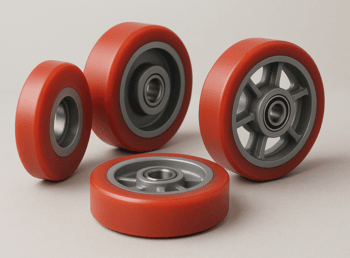


Discover the best material for polyurethane caster wheels, their benefits, and top uses. Learn to choose the right wheels for industrial applications.
If you’ve worked in manufacturing, warehousing, or material handling, you know that not all caster wheels are created equal. Polyurethane caster wheels have become the go-to choice for many industries thanks to their strength, floor protection, and quiet operation. But here’s the real question: what’s the best material for polyurethane caster wheels to maximize performance and lifespan?
In this guide, we’ll explore the science behind polyurethane wheels, compare material options, and help you understand which type of polyurethane delivers the perfect balance of durability, load capacity, and smooth movement.
Polyurethane caster wheels are wheels coated or molded with a polyurethane tread over a wheel core. This design blends the toughness of metal or composite cores with the resilience of polyurethane.
They’re commonly used in:
Compared to rubber or plastic wheels, urethane caster wheels offer superior wear resistance, reduced noise, and the ability to carry heavy loads without damaging floors.
Polyurethane’s popularity comes from its unique balance of properties:
While the tread is polyurethane, the wheel core material also matters. Here are the most common options:
Not all polyurethane compounds are the same. Factors that influence wheel performance include:
Custom polyurethane wheels are ideal when:
Many polyurethane wheels manufacturers offer tailored designs, including solid polyurethane wheels for extreme wear resistance.
Compared to rubber wheels, polyurethane:
Compared to steel wheels, polyurethane:
They’re used in industrial, commercial, and institutional applications where durability, load capacity, and floor protection are priorities.
Yes, for heavy-duty applications. They carry more weight, last longer, and resist chemicals better than rubber.
With proper maintenance, they can last 2-4 times longer than rubber wheels, depending on the environment and usage.
The best material for polyurethane caster wheels depends on your load requirements, operating environment, and desired performance characteristics. Whether you choose aluminum, steel, or composite cores, pairing them with the right polyurethane compound ensures long-lasting, efficient operation.
If you’re looking to upgrade or customize your wheels, consider working with a trusted manufacturer to get the perfect balance of durability, safety, and performance.
